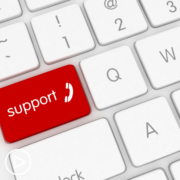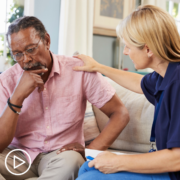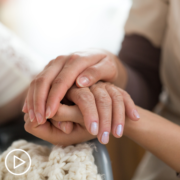How Could You Benefit from Joining a Prostate Cancer Support Group?
How Could You Benefit from Joining a Prostate Cancer Support Group? from Patient Empowerment Network on Vimeo.
What are some of the benefits provided by prostate cancer support groups? Prostate cancer survivor Jim Schraidt shares his perspective on how support groups can help patients with the emotional aspects of the disease as well as serve as a resource for information sharing.
Jim Schraidt is a prostate cancer survivor and Chairman of the Board of Directors for Us TOO International. Learn more about Jim Schraidt here.
See more from The Pro-Active Prostate Cancer Patient Toolkit
Related Resources

How Does Us TOO International Support Prostate Cancer Patients and Their Loved Ones? |

Newly Diagnosed with Prostate Cancer? Consider These Key Steps |

|
Transcript:
Jim Schraidt:
I think there are two primary ways that support groups are helpful. In the best case, a man will come to a support group as a newly diagnosed patient. And we’re actually working with a pilot project at Northwestern in Chicago where we have a support group that’s been in existence for a little over a year at this point.
But one of things that we’re working with the urology department there on is to get the urologists to refer newly diagnosed patients to the support group. And I think the primary benefits to a newly diagnosed patient are first, sort of removing some of the anxiety by talking to people who have been through the process and reminding them that in 90 percent of the cases they have some time to do some research, talk to people, and make a good decision that they can live with.
Because all of the treatments for prostate cancer, with the possible exception of active surveillance, come with side effects that a person undergoing this kind of treatment is going to have to live with for the rest of this life.
So, it’s a decision that’s very important. And to have the best possible outcome for a patient, they need to know what those side effects are. And they need to hear from men who have actually been through it.
I think the second important function of support groups is just support; after treatment, or if a patient is unfortunate enough to have recurrence or progression of his disease. And we’re not practitioners. We’re not medical practitioners. We don’t give medical advice. But there are lots of tricks of the trade, if you will, that men who have been coping with side effects can share with other men and help them get through it.
And part of that is just having a place to talk about what they’re going through, whether it’s things that they’re embarrassed to talk with their friends about, or things where they’re having difficulty communicating with their partner. I know from experience also that anger is a big thing that many patients experience, anger, and depression, post-treatment. And for me, one of the huge benefits of a support group was finding a place where that anger could go.
Because, I mean, even the best and most well-intentioned spouse, partner, or whatever, is going to grow tired of an angry patient partner.
And that can impact communication and can isolate a patient. So, it’s really important to have a place where some of that can go. And that’s part of the second piece, as far as I’m concerned.
The whole mental health piece really is under-emphasized, under-discussed by practitioners, but is very real for a lot of men undergoing this treatment. And the good news is that, that there is help available, and you can get through this. But many, many, many times you can’t do it on your own.
And you can’t do it solely with the help of your partner many times. So, this is one way you can talk to other people who have been through it, and they may have suggestions about therapy or talking to mental health practitioners.








